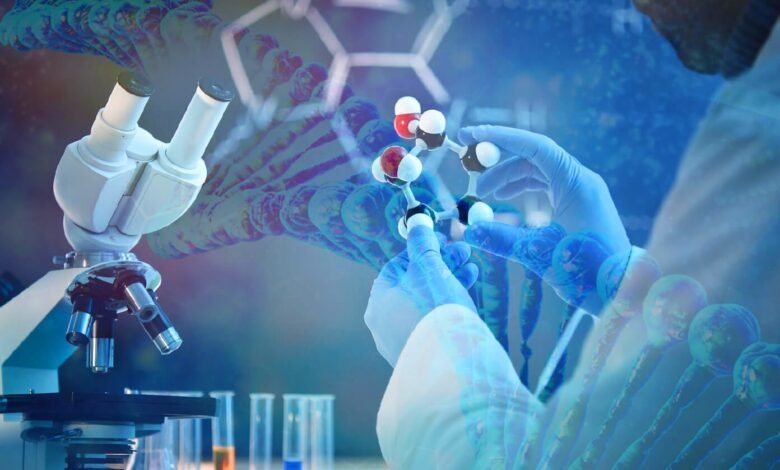Importance of Biotechnology in Medicine in 2023

Biotechnology plays a pivotal role in the field of medicine, revolutionizing healthcare practices and shaping the future of medical advancements. Through the integration of biology and technology, biotechnology offers innovative solutions to improve diagnostics, treatment options, and patient outcomes. In this article, we will explore the importance of biotechnology in medicine in 2023 and delve into various applications that have emerged in recent years.
Read More: Discover The Role of Gluten in Digestive Disorders
What is biotechnology?
Biotechnology refers to the utilization of biological systems, living organisms, or their derivatives to develop or modify products and processes for specific applications. It encompasses a wide range of scientific disciplines, including genetics, molecular biology, biochemistry, and bioinformatics.
Importance of biotechnology
Biotechnology has gained immense importance in the field of medicine due to its ability to revolutionize healthcare practices and offer novel solutions to complex medical challenges. By harnessing the power of biotechnology, scientists, and researchers can develop advanced diagnostics, personalized therapies, and innovative treatment modalities.
Biotechnology in Medicine
Overview of Biotechnology
In the realm of medicine, biotechnology serves as a catalyst for advancements by enabling the manipulation and understanding of biological processes at a molecular level. It provides tools and techniques that aid in the development of cutting-edge medical interventions.
Applications in Medicine
Biotechnology finds applications in various medical fields, including biopharmaceuticals, gene therapy, precision medicine, and regenerative medicine. These applications have revolutionized the way diseases are diagnosed, treated, and managed, offering hope for better patient outcomes and enhanced quality of life.
Biopharmaceuticals
Definition of Biopharmaceuticals
Biopharmaceuticals are pharmaceutical products derived from biological sources such as living cells, proteins, nucleic acids, or complex mixtures. They are designed to treat specific diseases or medical conditions and are produced using biotechnological processes.
Advantages of Biopharmaceuticals
Biopharmaceuticals offer several advantages over traditional pharmaceuticals. They exhibit higher specificity, lower toxicity, and enhanced efficacy. Additionally, they have the potential for personalized medicine and can target specific cellular pathways or disease mechanisms.
Examples of Biopharmaceuticals
Some prominent examples of biopharmaceuticals include monoclonal antibodies, recombinant proteins, vaccines, and growth factors. These therapeutic agents have revolutionized the treatment of diseases such as cancer, autoimmune disorders, and infectious diseases.
Gene Therapy
Definition of Gene Therapy
Gene therapy involves the introduction or alteration of genetic material within a patient’s cells to treat or prevent diseases. It aims to correct genetic abnormalities, replace missing or defective genes, or modulate gene expression to restore normal cellular functions.
How Gene Therapy Works
Gene therapy employs various techniques, such as viral vectors or gene editing tools like CRISPR-Cas9, to deliver therapeutic genes into target cells. These genes can help repair or replace faulty genes, enhance immune responses, or modify cellular processes to mitigate disease progression.
Benefits and Challenges
Gene therapy holds immense potential for treating genetic disorders and certain types of cancers. It offers the possibility of long-term and even permanent therapeutic effects. However, challenges such as off-target effects, immune responses, and the complexity of gene regulation pose obstacles to its widespread implementation.
Precision Medicine
What is Precision Medicine?
Precision medicine, also known as personalized medicine, is an approach that considers an individual’s unique genetic, environmental, and lifestyle factors to tailor medical treatments and interventions. It aims to provide customized care based on an individual’s specific characteristics and needs.
Personalized Treatments
Precision medicine enables healthcare professionals to select treatments and therapies that have a higher likelihood of success for a particular patient. By analyzing an individual’s genetic makeup, biomarkers, and clinical data, physicians can determine the most effective treatment options, reducing trial-and-error approaches.
Impact on Healthcare
Precision medicine has the potential to revolutionize healthcare delivery by improving treatment outcomes, reducing adverse drug reactions, and optimizing healthcare resource allocation. It allows for more targeted therapies, early disease detection, and prevention strategies, leading to better patient outcomes and cost-effective healthcare.
Regenerative Medicine
Introduction to Regenerative Medicine
Regenerative medicine involves the creation of functional tissues or organs to replace or repair damaged or diseased ones. It combines principles from various fields, including stem cell biology, tissue engineering, and biomaterial sciences, to regenerate and restore biological functions.
Stem Cell Therapies
Stem cell therapies are a vital component of regenerative medicine. These therapies utilize the unique properties of stem cells to repair or replace damaged tissues. Stem cells can differentiate into specialized cell types and promote tissue regeneration, making them invaluable for treating conditions such as spinal cord injuries, heart diseases, and neurodegenerative disorders.
Tissue Engineering
Tissue engineering focuses on creating functional and biocompatible substitutes for damaged or malfunctioning tissues. It involves combining cells, biomaterial scaffolds, and biochemical signals to generate three-dimensional structures that mimic native tissues. Tissue engineering holds promise for organ transplantation, wound healing, and the treatment of degenerative diseases.
Future Prospects
The future of biotechnology in medicine is promising, with ongoing research and development efforts aiming to enhance existing therapies and discover new treatment modalities. Advancements in areas such as nanotechnology, bioinformatics, and synthetic biology are expected to drive further breakthroughs in personalized medicine, regenerative medicine, and targeted therapies.
Conclusion
In conclusion, the importance of biotechnology in medicine cannot be overstated. It has revolutionized healthcare practices by enabling the development of advanced diagnostics, personalized treatments, and regenerative therapies. The applications of biotechnology, such as biopharmaceuticals, gene therapy, precision medicine, and regenerative medicine, have brought about significant improvements in patient care and outcomes. As we move further into 2023 and beyond, the integration of biotechnology in medicine will continue to shape the future of healthcare, offering innovative solutions to address complex medical challenges.
Read More: Enhancing Food Safety with Biotech in 2023
FAQs
What are some examples of biopharmaceuticals?
Some examples of biopharmaceuticals include monoclonal antibodies like Herceptin, insulin for diabetes management, and vaccines such as the COVID-19 mRNA vaccines.
How does precision medicine differ from traditional medicine?
Precision medicine considers an individual’s unique genetic, environmental, and lifestyle factors to tailor treatments, whereas traditional medicine follows a one-size-fits-all approach based on general population averages.
What are the potential challenges in implementing gene therapy?
Some challenges in implementing gene therapy include the risk of off-target effects, immune responses against the therapeutic genes, and the need for efficient delivery systems to target specific cells or tissues.
Can regenerative medicine lead to the creation of fully functional organs?
While regenerative medicine shows promise for organ regeneration, creating fully functional organs is a complex task that requires overcoming numerous technical and biological challenges. Current efforts focus on tissue repair and replacement rather than whole organ generation.
How will biotechnology in medicine impact the future of healthcare?
Biotechnology in medicine will drive advancements in personalized treatments, targeted therapies, and regenerative medicine, leading to improved patient outcomes, reduced healthcare costs, and a shift toward more precise and effective healthcare interventions.







